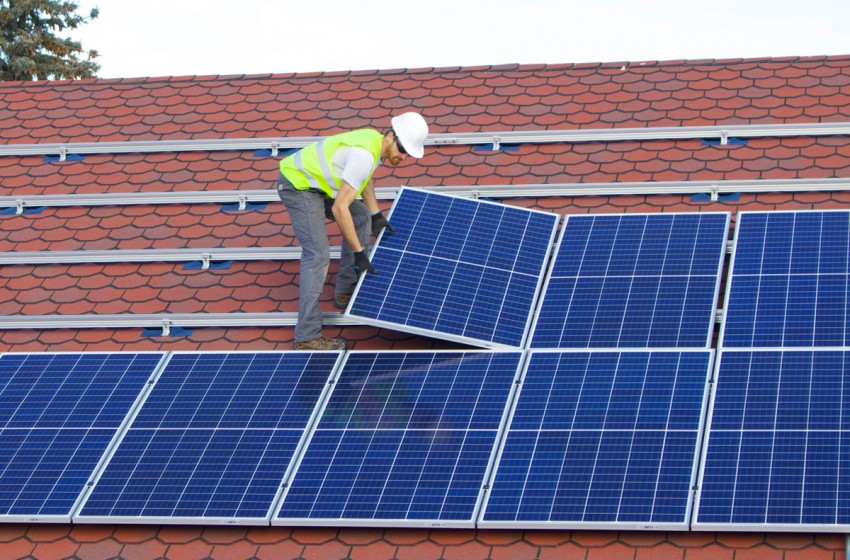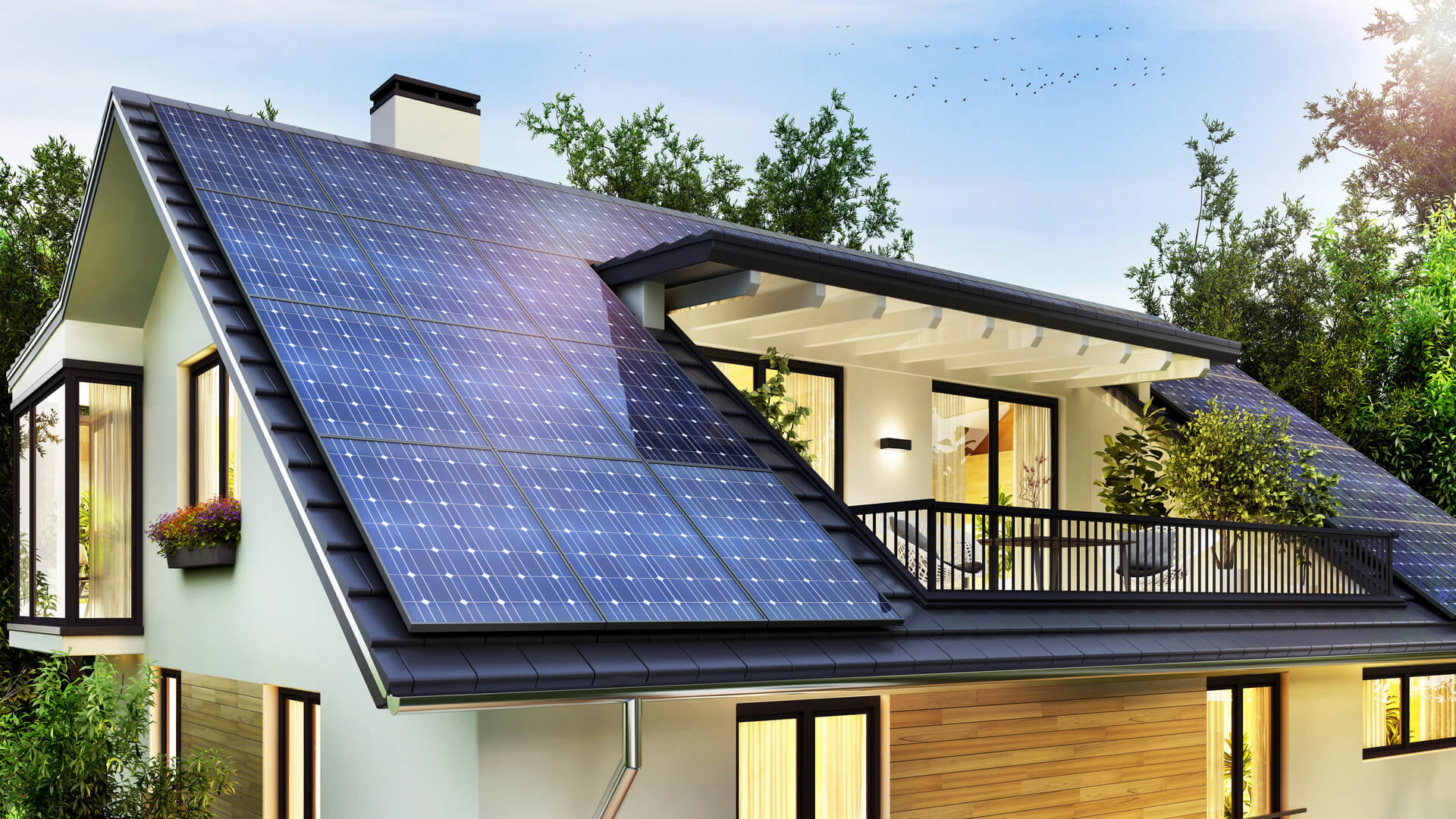Using solar panels offers many benefits, according to Taryn Holowka from the USGBC.
Despite the unexpected March storm, Stella, we’ve been warming up into spring here in the Northeast. Before we know it, summer will be here, and energy bills will rise due to the rising temperatures. If you are looking for best solar panels then go through https://www.caandesign.com/solar-energy-for-households-and-how-to-make-the-switch-in-2023/.
The use of solar panels can help you offset energy costs, reduce your home’s environmental impact, contribute to energy independence, and support local businesses.
Are you interested in installing solar panels on your home? As far as I am concerned, solar panels provide the following four benefits:
1. Energy bills can be reduced or eliminated.
This one is very great. We have three children and two adults living in our home, and although though Washington, D.C. receives an average amount of sunlight, it is sufficient to power our household for a net-zero energy cost. We produce far more energy during the warm spring days than we use, and we trade that with the utility. We draw from the grid when the air conditioner is running during the hot summer months or when it’s gloomy outside.
A cloudy location typically receives more than two hours of sunlight per day, while a sunny location gets an average of 5.5 hours.
While sunny days will provide more solar energy, solar panels will still draw power even when it is cloudy outside. However, diffused or indirect sunlight will help to illuminate your home. On gloomy days, between 10 to 20 percent of the energy produced on bright days is normally produced.
2. Obtain rebates and tax credits.
Our solar panels are actually making money for us, which I had no idea would be a significant benefit. When you submit your taxes, you will initially be eligible for a federal income tax credit that will reimburse you for 30% of the total system expenditures, including equipment and installation.
Total expenditures can be decreased in half by combining this with state, municipal, and solar renewable energy credits (SRECs). SRECs are produced all year round and can be sold to utility companies for a very good return on your initial investment.
The Renewable Portfolio Standard Expansion Act of 2016 was signed by Muriel Bowser, the mayor of Washington, D.C., in the summer of 2016. By the year 2032, this Act (B21-0560) will increase the percentages of solar and renewable portfolio to 50 and 5, respectively. Furthermore, the measure creates a programme under the Department of Energy and the Environment to help low-income households put solar panels on their homes.
As a result of this act, D.C.’s solar industry is expected to grow by 170 percent over the next year.
The solar panels have a warranty of 10 years and a functional life of 25 years, meaning you can generate free electricity and bonus credits for more than 20 years. However, the investment has a return period of only 3.5 years. It’s tough to surpass. It’s both commercially successful and socially responsible.
Many installers also provide free installations, where they pay for the panels and the installation out of their own pockets and then charge a discounted fee for electricity. In a sense, they are “rent” the space on your roof from you in exchange for a lower electricity bill. For homeowners who prefer a no-money-down option or do not want to make the initial investment, this is a good choice. In this scenario, the installer receives all SREC revenue.
Solar tax credits are available no matter where you live. Don’t miss out on these opportunities.
3. Make savings a priority from the start.
Energy bills on an annual basis can reach thousands. Actually, total annual energy consumption per person, including transportation and residential energy, is $3,052. As soon as they are deployed, solar electricity can cut or eliminate these expenses. Since utilising solar energy is essentially free, they also provide long-term savings.
Solar panels significantly raise your home’s market value. The majority of home buyers are aware of what a home with solar panels signifies because the system is already established and they didn’t have to pay the original cost for the system’s purchase and installation. According to a research, each kilowatt added increases a homeowner’s home’s resale value by $5,911. Therefore, adding a 3.1 kilowatt system may boost your home’s value by over $18,000.
Solar panels shield a roof from the elements, such as rain, snow, and debris, extending the lifespan of the roof. In the summer, they increase the energy efficiency of the home since the panels absorb the hot sun’s rays, preventing the roof from being directly heated by the sun.
4. We all benefit when we help the environment.
Solar energy systems use the sun to generate clean, pure energy. By adding solar panels to your home, you can lessen global warming emissions and our reliance on fossil fuels. Coal and natural gas are two fossil fuels that are the primary sources of conventional power. When fossil fuels are used to create power, they release dangerous gases that are the main contributor to smog and climate change on a worldwide scale. As a result, the price is continually erratic and subject to sudden increases.
Public health is also improved by renewable energy. Plants using coal and natural gas pollute the air and water, endangering human health. However, switching from fossil fuels to renewable energy sources like solar power can lower both overall health care costs and premature mortality.
Solar energy consumes little to no water, whereas the production of fossil fuels utilizes a lot of water and pollutes the environment. In other words, solar energy does not only not contaminate water supplies, but it also does not impose a pressure on the global water supply.
During a drought or heat wave, solar power can still be used. For cooling, a lot of water is used in the production of coal, gas, and nuclear energy. Electricity generation is at risk during heat waves and extreme droughts, as we have recently seen. However, solar energy systems do not need water to produce electricity.
Additionally, solar energy generates clean energy jobs. America has been setting the global standard for clean energy. In spite of government budget cuts to the EPA and DOE, it is to be hoped that innovative and forward-thinking businesses will continue to embrace the evolving nature of energy production and shift to renewables.
Finally, if you are designing a green home, you may want to look at the LEED credits for solar orientation, building orientation for passive solar, and renewable energy.
Solar energy’s benefits
How does solar energy benefit you? There are three types of solar energy:
renewable and sustainable. Other fuel sources that demand exploration must be mined from the earth and are subject to depletion. Sunlight is regenerative.
Once they’ve been put in place, all you need to do is keep them clean and free of obstructions so that sunlight can reach every inch of the panel.
The silence. The conversion of sunlight into electricity does not produce any noise.
An eco-friendly product. A solar electric power plant or a solar panel for home use has no emissions or negative environmental impacts.
cost-effectiveness increasing The cost of installing solar panels in a home can be lessened by taking advantage of federal tax breaks and rebates for renewable energy. The initial investment (in equipment and installation costs) made by homeowners in solar energy is also being repaid much more quickly thanks to developments in the technology used to produce it.
Solar energy for houses is becoming more affordable and is getting closer to being on par with other kinds of electricity. In reality, 34 states currently adhere to renewable portfolio standards. These laws force electricity companies to switch a specific proportion of the power they produce and give consumers with renewable sources over the course of several decades, ensuring that the public benefits of renewable energy are recognized.
Solar Electric Systems: How They Work
Only a modest amount of power is generated by one solar cell. When several cells are joined, they create panels or modules that can provide extra energy.
Homeowners can customize solar power systems to suit their own needs because solar cells are modular and expandable. Solar panels for residential usage can be standalone or integrated into an existing electrical distribution system (one that is connected to the grid but still draws power from other sources) (off-grid).
What Are the Benefits of Solar-Powered Homes?
Make sure your home receives enough solar energy to satisfy your demands effectively and inexpensively before making an investment in a solar system. Does the majority of the day and all year round sunshine enter your home with no obstructions? If not, your house might not be a strong contender. Your neighborhood electric company may offer a solar site analysis or instruct you on how to carry one out on your own.
The Best Ways to Use Solar Energy at Home
A tiny photovoltaic (also known as PV) solar electric system can provide clean electricity for your house or place of business. Direct and reflected sunlight are both used by PV systems to generate electricity. However, the PV system produces more power the more direct solar energy that gets to it. Although these systems can be used anywhere, they perform best in the Southwest and other parts of the United States that receive more sunlight on average each year.
Solar energy can still be used to save money and energy even if you cannot afford a solar electric system.
heaters for solar water. Since we use hot water virtually every day, heating water is one of the best applications of solar energy. Solar water heaters are a viable substitute for traditional electric or gas units. Water heated by solar panels is then transported to a storage tank. Additionally, homeowners may benefit from a special federal tax credit offered for solar water heaters.
Solar outdoor lighting. Solar cells are used to turn sunlight into electricity in outdoor energy-saving lights (like solar floodlights or solar security lights). Special batteries are used to store the electricity used by outdoor solar lighting. These batteries provide the lights’ power at night.
A solar lighting system’s replacement batteries and bulbs should be available, so check before buying. Think about your home’s landscaping as well. Place small individual solar panels in sunny areas as well as self-contained items like solar floodlights and security lights. Solar light battery charging and performance can potentially be impacted by shade from trees and structures.
The solar oven. Solar ovens are becoming more and more common household equipment, whether you build your own or buy a pre-built model. A solar oven functions similarly to an electric crockpot as a slow cooker. A solar oven cooks food over a long period of time at relatively low temperatures by using angled reflectors to direct solar energy into a special chamber. The fuel source is once more freely accessible in the form of sunlight.
Small appliances with solar power. Comparing rechargeable personal electronic devices to large appliances like refrigerators, washers, and dryers, and HVAC systems, they could seem insignificant. However, taking into account all the energy-related expenses related to using these devices, it appears that they use more energy than we initially think. A solar-powered phone and tablet charger can be a convenient, affordable, and effective way to start teaching your family about the advantages of solar energy (and it’s ideal for off-grid travel).







Leave a Reply